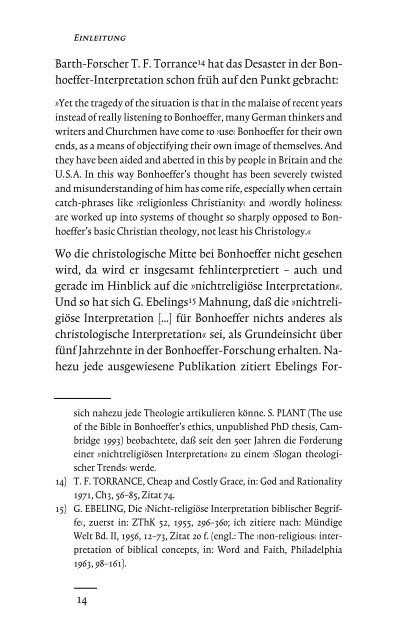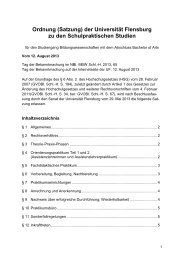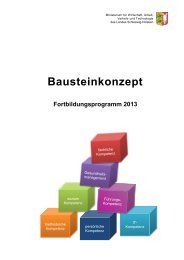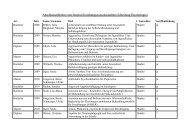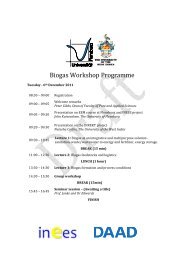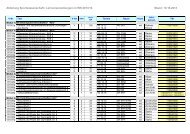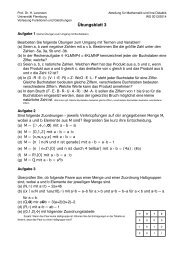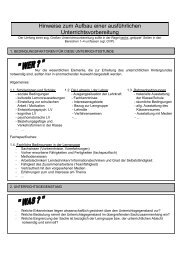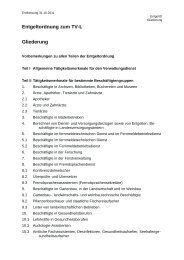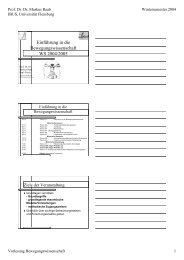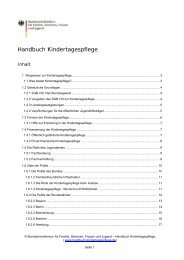Eine Theologie des Lebens. Dietrich Bonhoeffers - Universität ...
Eine Theologie des Lebens. Dietrich Bonhoeffers - Universität ...
Eine Theologie des Lebens. Dietrich Bonhoeffers - Universität ...
Erfolgreiche ePaper selbst erstellen
Machen Sie aus Ihren PDF Publikationen ein blätterbares Flipbook mit unserer einzigartigen Google optimierten e-Paper Software.
Wüstenberg 04.07. 11.08.2006 13:18 Uhr Seite 14<br />
Einleitung<br />
Barth-Forscher T. F. Torrance 14 hat das Desaster in der Bonhoeffer-Interpretation<br />
schon früh auf den Punkt gebracht:<br />
»Yet the tragedy of the situation is that in the malaise of recent years<br />
instead of really listening to Bonhoeffer, many German thinkers and<br />
writers and Churchmen have come to ›use‹ Bonhoeffer for their own<br />
ends, as a means of objectifying their own image of themselves. And<br />
they have been aided and abetted in this by people in Britain and the<br />
U.S.A. In this way Bonhoeffer’s thought has been severely twisted<br />
and misunderstanding of him has come rife, especially when certain<br />
catch-phrases like ›religionless Christianity‹ and ›wordly holiness‹<br />
are worked up into systems of thought so sharply opposed to Bonhoeffer’s<br />
basic Christian theology, not least his Christology.«<br />
Wo die christologische Mitte bei Bonhoeffer nicht gesehen<br />
wird, da wird er insgesamt fehlinterpretiert – auch und<br />
gerade im Hinblick auf die »nichtreligiöse Interpretation«.<br />
Und so hat sich G. Ebelings 15 Mahnung, daß die »nichtreligiöse<br />
Interpretation [...] für Bonhoeffer nichts anderes als<br />
christologische Interpretation« sei, als Grundeinsicht über<br />
fünf Jahrzehnte in der Bonhoeffer-Forschung erhalten. Nahezu<br />
jede ausgewiesene Publikation zitiert Ebelings For-<br />
sich nahezu jede <strong>Theologie</strong> artikulieren könne. S. PLANT (The use<br />
of the Bible in Bonhoeffer’s ethics, unpublished PhD thesis, Cambridge<br />
1993) beobachtete, daß seit den 50er Jahren die Forderung<br />
einer »nichtreligiösen Interpretation« zu einem ›Slogan theologischer<br />
Trends‹ werde.<br />
14) T. F. TORRANCE, Cheap and Costly Grace, in: God and Rationality<br />
1971, Ch3, 56–85, Zitat 74.<br />
15) G. EBELING, Die ›Nicht-religiöse Interpretation biblischer Begriffe‹,<br />
zuerst in: ZThK 52, 1955, 296–360; ich zitiere nach: Mündige<br />
Welt Bd. II, 1956, 12–73, Zitat 20 f. (engl.: The ›non-religious‹ interpretation<br />
of biblical concepts, in: Word and Faith, Philadelphia<br />
1963, 98–161).<br />
14


